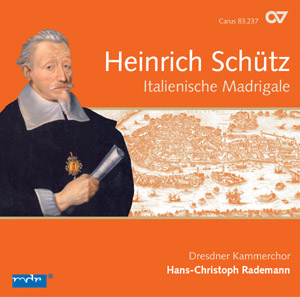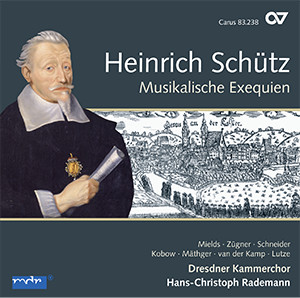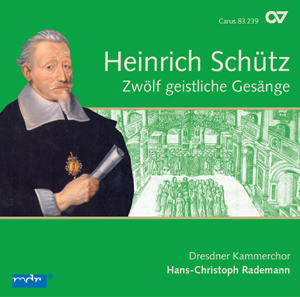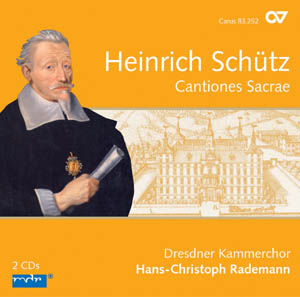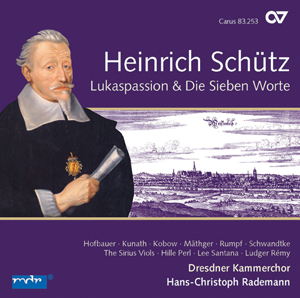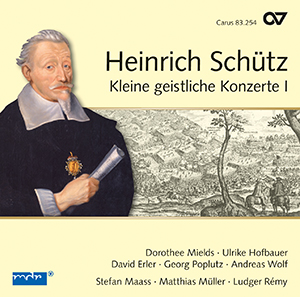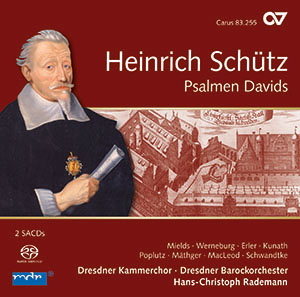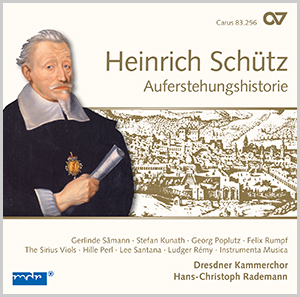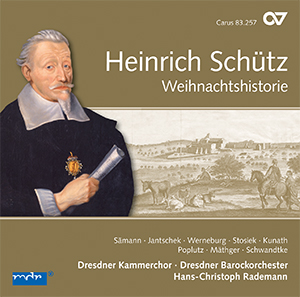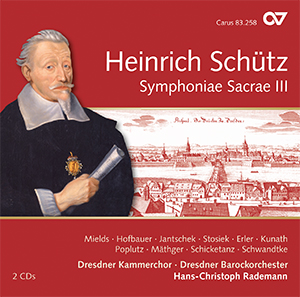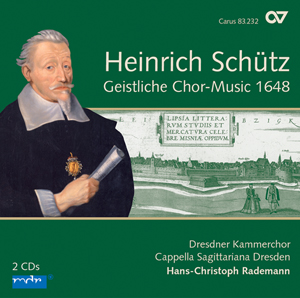
Geistliche Chor-Music 1648. Enregistrement complet (Rademann)
Lorsqu'il s'agit de faire honneur à l'art de Heinrich Schütz, son talent dans le maniement de la langue et du texte vient en première position. Dans Geistliche Chor-Music, une de ses œuvres centrales composée en 1648, on retrouve le même raffinement dans la mise en musique du contenu textuel.
Dans sa préface au recueil de 29 motets à 5, 6 et 7 voix, Schütz citait cette oeuvre comme modèle pour la composition sans basse continue – convaincu que tout jeune compositeur devait acquérir „les justes fondements d’un bon contrepoint“. Malgré le contrepoint strict qui marque un retour à la tradition ancienne, le „Musicus poeticus“ réussit à donner à ses motets un caractère fortement expressif.
Les motets isolés sont structurés différemment et se distinguent en longueur et caractère. De courtes pièces, plutôt sobres côtoient d'autres plus longues et de grande intensité expressive, l'optimisme joyeux côtoie la plainte implorante.
Vol. 1 de l'enregistrement intégral des œuvres de Heinrich Schütz avec le Dresdner Kammerchor sous la direction de Hans-Christoph Rademann. Récompensé par le Pizzicato Supersonic Award.
Sommaire
-
Compositeur
Heinrich Schütz
| 1585-1672Heinrich Schütz is regarded as the first German musician of European stature. As a choirboy from 1599 at the court of Landgrave Moritz of Hessen-Kassel, he received a thorough education. In 1608 he began a law degree in Marburg, but broke this off in 1609 in order, with the support of the Landgrave, to study composition with Giovanni Gabrieli, organist at St Mark’s in Venice. In 1613 Schütz returned to Kassel, but two years later was enticed away by Elector Johann Georg I of Saxony to the Dresden court as “Organist und Director der Musica”, where he held the position of Hofkapellmeister (court Kapellmeister) from 1617 until his death. Schütz’s great cycles of vocal works marked the high point of his reputation in Germany and northern Europe. But these represent only part of Schütz’s output; individual works are represented in printed collections with works by other composers, others only survive in manuscript, and much has been lost. The Stuttgart Schütz Edition makes available Schütz’s complete oeuvre, and all works are also published in practical Urtext editions. Plus d'information sur la personne
-
L'auteur de l'avant-propos
Katrin Bemmann
-
Chœur
Dresdner Kammerchor
Le Dresdner Kammerchor (Chœur de chambre de Dresde) – l’un des meilleurs chœurs d’Allemagne – est bien connu pour sa sonorité unique, faite d’une grande intensité et clarté. Rayonnement dynamique, homogénéité et transparence sonores souvent cités en exemple sont les points forts de cet ensemble demandé au niveau international. Le chœur a été créé en 1985 par Hans-Christoph Rademann et des étudiants du Conservatoire de musique « Carl Maria von Weber » de Dresde. De nombreuses tournées de concerts ont établi la notoriété de l’ensemble également hors d’Europe. En ont résulté des invitations régulières à d’importants festivals internationaux. Le répertoire du chœur va de la musique de la Renaissance à des compositions du 21ème siècle. Des interprétations de la musique chorale romantique et contemporaine ont été récompensées de prix spéciaux lors de concours internationaux, ainsi que du prix d’encouragement de la fondation Ernst von Siemens. En dehors de la pratique a cappella, le chœur de chambre se consacre intensément à la coopération avec le Dresdner Barockorchester et l’ensemble « Alte Musik Dresden », donnant des impulsions importantes à la pratique de la musique ancienne en Saxe. Une foule d’enregistrements pour la radio et pour le CD, ainsi que la coopération avec des orchestres allemands et étrangers viennent renforcer la renommée du Chœur de chambre de Dresde. Le CD paru aux Editions Carus de Stuttgart, avec le premier enregistrement mondial du Requiem en mi bémol majeur de Johann Adolf Hasse s’est vu décerner le prix de la Critique allemand du disque. Plus d'information sur la personne
-
Ensemble
Cappella Sagittariana Dresden
Dans les années 1970, s’est formé à partir de la « Sächsische Staatskapelle Dresden » (Orchestre d’Etat saxon de Dresde) un ensemble de musique ancienne baptisé Cappella Sagittariana Dresden. Les musiciens Bernd Haubold (viole de gambe et violone), Wolfram Just (violon et viole d’amour) et Wolfram Steude (continuo d’orgue) en étaient les protagonistes. Une formation devenue l’un des ensembles dominants du genre dans l’ancienne Allemagne de l’Est. Dans les années qui suivent, il entreprend nombre de tournées de concerts, entre autres à Saint-Pétersbourg, en Allemagne de l ’Ouest ainsi que dans l’étranger européen. Une coopération dynamique avec des personnalités musicales renommées telles que par exemple le ténor Peter Schreier et le spécialiste de musique ancienne Frieder Bernius lui valent une reconnaissance supplémentaire. En septembre 2006, l’ensemble a fusionné avec l’orchestre « Alte Musik Dresden », créé en 1993 par des membres de la Philharmonie de Dresde et qui s’était consacré jusque-là essentiellement à la redécouverte de l’héritage musical du centre de l’Allemagne et de la Saxe, fusion donnant naissance à la nouvelle formation « Cappella Sagittariana Dresden ». Celle-ci est devenue officielle dans un lieu fortement symbolique, à savoir dans la chapelle du château de la résidence de Dresde, démontrant clairement que ses musiciens continuent à se sentir les héritiers particuliers de l’œuvre créatrice de Heinrich Schütz (Henricus Sagittarius). Plus d'information sur la personne
-
Chef d'orchestre
Hans-Christoph Rademann
| 1965Conductor Hans-Christoph Rademann is an immensely versatile artist with a broad repertoire who devotes himself with equal passion and expertise both to the performance and rediscovery of early music and to the first performances and cultivation of Contemporary Music. Born in Dresden and raised in the Erzgebirge mountains, he was influenced at an early age by the great Central German kantorial and musical tradition. He was a student at the traditional Kreuzgymnasium, a member of the famous Kreuzchor, and studied choral and orchestral conducting at the Carl Maria von Weber University of Music in Dresden. During his studies, he founded the Dresdner Kammerchor and formed it into a top international choir which is still under his direction today. Since 2013, Hans-Christoph Rademann has been the academy director of the International Bach Academy Stuttgart. He regularly collaborates with leading choirs and ensembles of the international music scene. From 1999 to 2004 he was chief conductor of the NDR Choir and from 2007 to 2015 chief conductor of the RIAS Chamber Choir. Guest conducting engagements have led and continue to lead him to the Nederlandse Bachvereniging, the Collegium Vocale Gent, the Akademie für Alte Musik, the Freiburger Barockorchester, the Deutsche Radiophilharmonie Saarbrücken Kaiserslautern, the Sinfonieorchester Basel, the Orchestre Philharmonique de Luxembourg, among others. Hans-Christoph Rademann has been awarded prizes and honors for his artistic work, including the Johann Walter Plaque of the Saxon Music Council (2014), the Saxon Constitutional Medal (2008), the Sponsorship Prize as well as the Art Prize of the state capital Dresden (1994 and 2014 respectively). He received the Preis der Deutschen Schallplattenkritik several times for his numerous CD recordings (most recently in 2016), as well as the Grand Prix du Disque (2002), the Diapason d’Or (2006 & 2011), the CHOC de l’année 2011 and the Best Baroque Vocal Award 2014. In 2016 he was awarded the European Church Music Prize of the city of Schwäbisch Gmünd. His exemplary interpretation and recording of the complete works of Heinrich Schütz with the Dresdner Kammerchor in the Stuttgart Carus-Verlag, which was completed in 2019, was awarded the newly endowed Heinrich Schütz Prize as well as the OPUS KLASSIK 2020 in the same year. Hans-Christoph Rademann is professor of choral conducting at the Carl Maria von Weber University of Music in Dresden. He is also artistic director of the Musikfest Erzgebirge, ambassador of the Erzgebirge and patron of the Christian Hospice Service Dresden. Plus d'information sur la personne
Critiques
![]()
… The balance within voices and with the instruments is beautifully managed, and the conviction of the performances is both subtle and palpable. Schütz's musical language here is refined, sparin and understated: qualities that can be applied just as well to Rademann's splendid performances.
(Nigel Simeone, International Record Review, September 2011)
Here is a new and delightfully satisfying recording of the complete series of 29 motets. The featured choir and small band of instrumentalists are utterly committed to conveying not only the music's considerable beauty and profundity, but also its place in such stylistic developments. They are aware of the exact relationship between text and melody/texture. Their enunciation of the German is clarity itself. [...] Like Bach, Schütz saw the music as supporting the religious intention of the texts. This requires a careful balance; and that's a balance and sets of nuances of which director, Hans-Christoph Rademann, is very much in control. [...] The acoustic and recording are sympathetic to Schütz's idiom; and are first rate effective, supporting and enhancing with just the right touch of resonance.
(Mark Sealy, musicweb-international.com, Mai 2011)
Das Dresdner Ensemble agiert [...] mit allerfeinster Gesangskultur: das klingt wunderbar kultiviert, absolut sauber und zu jedem Zeitpunkt transparent. Und es macht unglaublich Lust auf die nächsten CDs dieser Gesamteinspielung.
(Frank Pommer, Die Rheinpfalz, 19.03.2011)
Um als Hörer tief in diese Musik vordringen zu können, sind sinnlich betörende, flexibel den Klang modellierende Aufführungen nötig. Solche liefert unangestrengt vollendet der Dirigent Hans-Christoph Rademann und sein Dresdner Kammerchor, den er ein paar Jahre vor der Wende gegründet hat. Jetzt haben sie mit der „Geistlichen Chor-Musik” und den „Italienischen Madrigalen” bei Carus eine Schütz-Gesamteinspielung begonnen – ein betörendes Unternehmen, das Farbigkeit, Agilität, Wärme über strukturelle Strenge stellt.
(Reinhard Brembeck, Süddeutsche Zeitung, 02.03.2011)
Endlich Frieden - das war im Druckjahr dieser Motettensammlung die Stimmung in Mitteleuropa. So sehr Schütz über den Tag hinaus dachte, immer wieder scheint ein Aufatmen durch die kunstvolle Einfachheit der biblischen Stücke zu gehen. Vorbildlich tonschön zelebriert der Dresdner Kammerchor unter Hans-Christoph Rademann barocke Glaubensinnigkeit.
(Johannes Saltzwedel, Spiegel, Nov. 2007)
Questions fréquentes sur l'œuvre
 Il n'y a pas encore de questions et réponses concernant cette œuvre ou vous n'avez pas trouvé la réponse à votre question sur l'œuvre ? Cliquez ici et envoyez votre question spécifique à notre service clients.
Il n'y a pas encore de questions et réponses concernant cette œuvre ou vous n'avez pas trouvé la réponse à votre question sur l'œuvre ? Cliquez ici et envoyez votre question spécifique à notre service clients.





